Semi-Annual Report 2024
Ghawth is a local NGO established in 2009 by a group of doctors in Lebanon. The aim for establishing this NGO is to enhance the medical services for refugees and host community, and to ensure that the most vulnerable population groups will have access to primary, secondary, and tertiary healthcare services.
The 2024 semi- annual report summarizes the progress made by Ghawth in its program goals, which fits with the following outcomes of the Lebanon Crisis Response Plan (LRP):
- Improve access to comprehensive primary healthcare (PHC).
- Improve access to the hospital (incl. the E.R and O.R. care) and advanced referral care (advanced diagnostic laboratory and radiology care).
In addition, it identifies challenges, priorities, and recommendations.
- Achievements of Ghawth:
The total number of beneficiaries in the first half of 2024 reached 44,501, with 17,105 males (38%) and 27,396 females (62%).
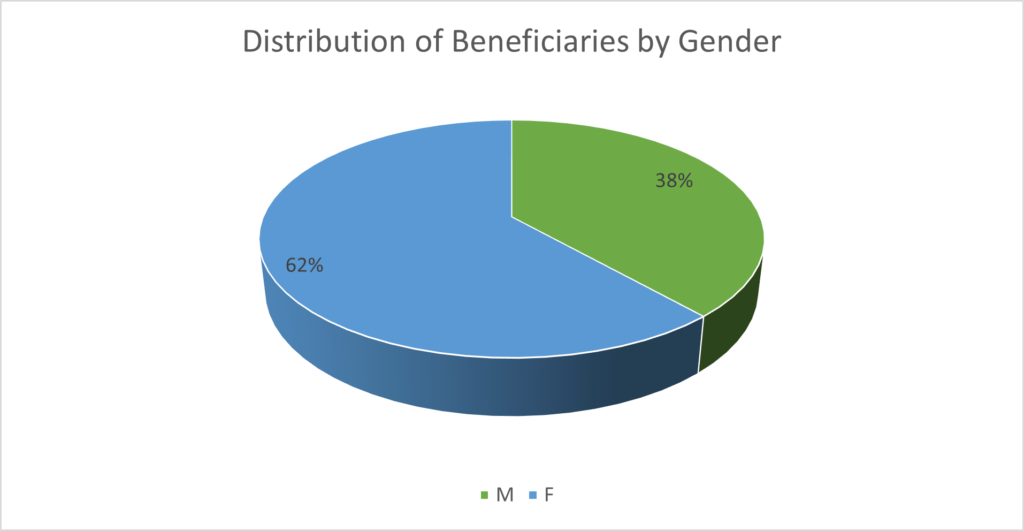
The decrease in the number of beneficiaries from the previous first half year (2233 beneficiaries) does not reflect the reality of the health situation in Lebanon; it is due to a shortage of funds rather than an improvement in health. The number of patients in need for whom we are unable to provide care is steadily increasing in comparison to 2023.
The table below compares the number of beneficiaries between January and June for the years 2022-2023-2024.
| Jan-June 2022 | Jan-June 2023 | Jan-June 2024 | |
| Consultations | 44783 | 45545 | 44030 |
| Medical Services | 57407 | 55945 | 45179 |
| Medications | 22965 | 23371 | 19303 |
| Surgeries | 282 | 340 | 213 |
| # Of Beneficiaries | 46300 | 46734 | 44501 |
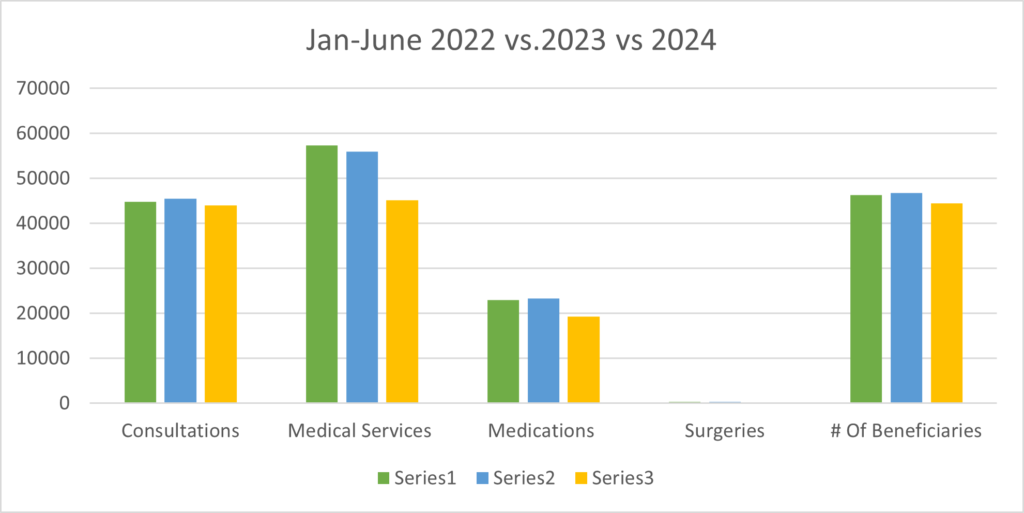
The decrease in the number of beneficiaries in GHAWTH Medical Centers (5%) is less than the decrease in other medical centers across Lebanon (16%), as shown in the graphs below, according to the Activity Info Report for the month of April, which was presented at the Health Working Group meeting at the end of May 2024.
The main reason for the decrease in the number of beneficiaries in Lebanon is likely to be a decrease in support for medical centers, and thus the centers’ ability to provide all necessary services for free, particularly medication (in the context of the negative adaptation that patients in Lebanon make to overcome harsh living conditions, they go directly to the pharmacy in order to obtain health care at a lower cost, according to their belief).


The distribution of the number of beneficiaries by nationality is shown in the table below:
| Nationality | # | % |
| Syrian | 34439 | 77% |
| Lebanese | 9349 | 21% |
| PRL | 423 | 1% |
| PRS | 167 | 0.5% |
| Other | 123 | 0.5% |
| Total | 44501 | 100% |
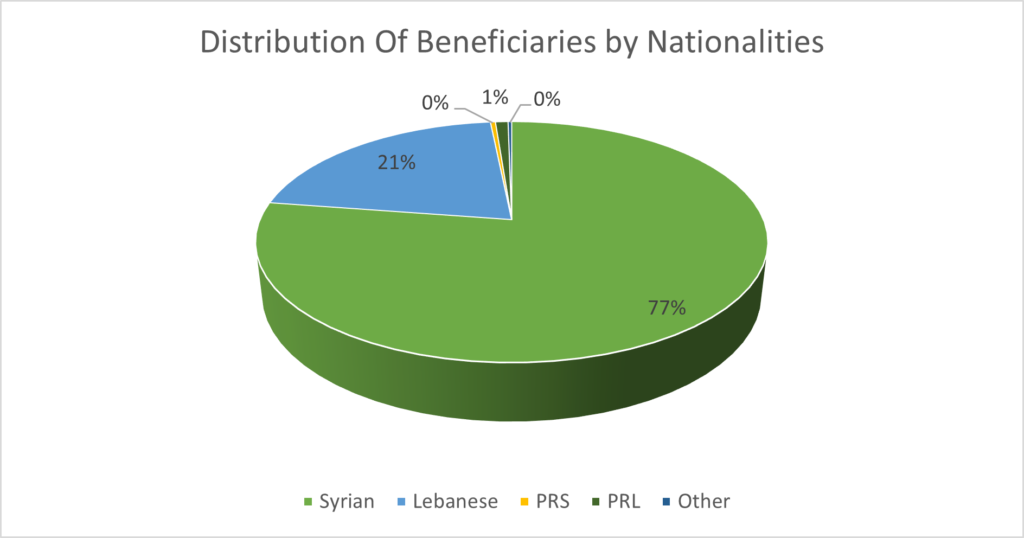
- Primary Health care:
GHAWTH provides primary health care services to vulnerable Lebanese as well as other populations such as PRL, PRS, Syrian refugees, and migrants through four medical centers (PHCCs).
- Dar Al Wafaa PHC.
- Medical Village Dispensary.
- Ghawth Dispensary-Aarsal (MCA).
- Al Rawda Dispensary.
The comprehensive package of services includes consultation, vaccination, medication for acute and chronic conditions, child health, noncommunicable disease care, sexual and reproductive health, malnutrition screening and management, mental health, disability services, dental care, and health promotion and referral.
Primary health care is one of GHAWTH’s priorities in order to strengthen the health system in Lebanon.
Supported by (NORWAC, IMC, IOCC, ANERA), In the first half of 2024, GHAWTH provided 44,030 medical consultations, 1,978 children benefited from vaccination, and 45,179 patients benefited from medication.
- Beneficiaries Distribution by Gender:
The total number of beneficiaries from primary health care in the first half of 2024 reached 44,356, with 16,998 males (38%) and 27,358 females (62%).
| Beneficiaries Distribution by Gender | ||
| Gender /#, % | # | % |
| Total Male | 16,998 | 38 % |
| Total Female | 27,358 | 62 % |
| Total | 44,356 | 100% |
B. Beneficiaries Distribution by Medical Center:
The total number of Beneficiaries in first half of 20204 are distributed on the four following medical centers:
| Medical Center | # | % |
| Rawda | 7,703 | 17% |
| Dar Al-Wafaa PHC | 6,930 | 16 % |
| MCA | 19,601 | 44% |
| Medical Village | 10,122 | 23% |
| Total | 44,356 | 100% |
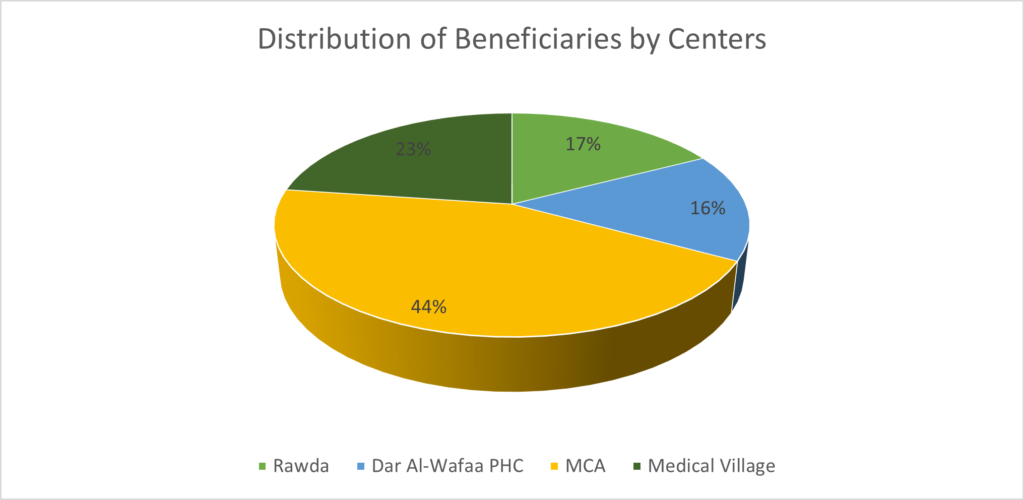
C. Consultations Distribution by Clinic:
Women and children constitute the largest number of beneficiaries of primary health care services (82%), as the table below shows the distribution of the number of beneficiaries by clinics:
| Clinic | # | % |
| General Medicine | 12,228 | 28% |
| Pediatric | 12,392 | 28% |
| Dentist | 4,932 | 11% |
| Gynaecology | 7,573 | 17% |
| Cardiology | 1,306 | 3% |
| General Surgery | 192 | 0% |
| Orthopedic | 1,196 | 3% |
| Gastroenterology | 95 | 0% |
| Dermatology | 417 | 1% |
| Urology | 203 | 0% |
| Ophthalmology | 71 | 0% |
| Emergency cases | 233 | 1% |
| In Patient | 288 | 1% |
| ENT | 930 | 2% |
| Nutrition | 0 | 0% |
| Endocrinology | 1,965 | 4% |
| Mental Health | 9 | 0% |
| Total | 44,030 | 100% |
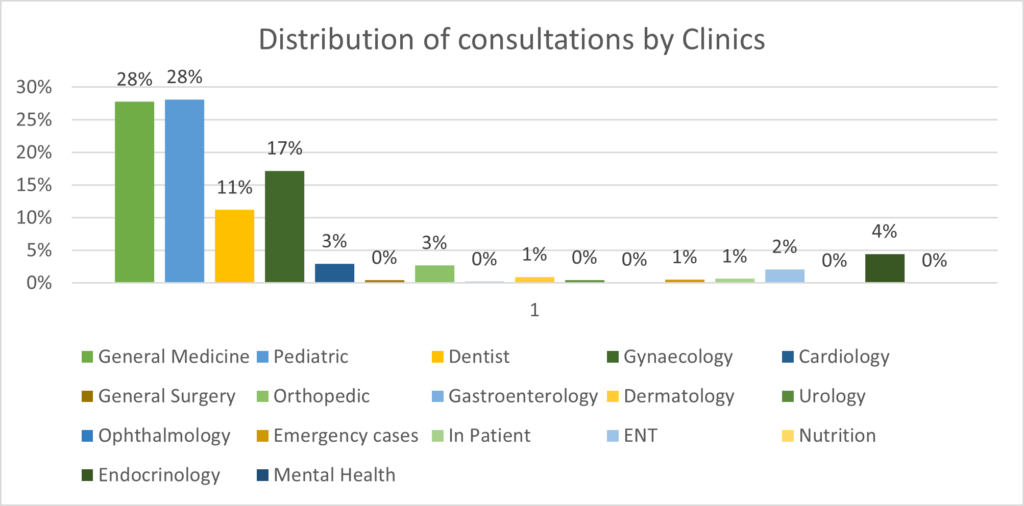
2. Secondary Health Care:
GHAWTH also provides secondary health care services to vulnerable Lebanese as well as other populations such as PRL, PRS, Syrian refugees, and migrants through GHAWTH Medical Centers and the contracted hospitals in all of Lebanon. The secondary health care services include cold surgeries and dialysis sessions.
In the first half of 2024, GHAWTH provided financial support to conduct 274 (11% Lebanese) surgeries and 5,785 dialysis sessions (funded by NORWAC).
The total number of beneficiaries of dialysis sessions was 84.
The distribution of the number of dialysis patients by gender is shown in the table below:
| Beneficiaries Distribution by Gender (Dialysis Sessions) | ||
| Gender /#, % | # | % |
| Total Male | 49 | 58 % |
| Total Female | 35 | 42% |
| Total | 84 | 100% |
- The challenges:
The compounded multi-layered socioeconomic crises have further hampered the meaningful access of displaced women, men, girls, boys, and other vulnerable populations to primary and secondary health care.
- Access Challenges: Affordability, including the direct (Costs of surgeries and medications….) and indirect costs of services like transportation fees, remained the main challenge to accessing health care services in the first half of 2024.
- Funding Challenges: The majority of NGOs in Lebanon are experiencing a financing problem as a result of the restricted support supplied by donors as a result of the ongoing worldwide crises. This hampered Ghawth’s ability to meet growing demands, whether at the primary or secondary health care levels.
A lack of finance immediately reduces access to health care, resulting in higher morbidity and mortality. Ghawth was strained in the first half of 2024 to prioritize life-saving interventions, leaving less severe, underfunded situations. (The number of patients targeted in the dialysis project has been reduced from 80 patients to 60 patients).
- The Lebanese government’s increased pressure on Syrian refugees exacerbated tensions and the intensity of hate speech directed at refugees, limiting some refugees’ access to primary or secondary health care due to the fear of moving without identification papers or valid residency.
- The increasing security situation in southern Lebanon impacted the supply of some medical goods in the market, as some INGOs and hospitals activated emergency plans and boosted their stock of medical supplies, putting further strain on their availability in the local market.
- Conclusion of the chronic disease medication support project financed by ANERA at the end of August 2024, and the increased demand for chronic drugs by Lebanese displaced from southern Lebanon.
- Priorities, and Recommendations:
- To strengthen Lebanon’s health system, GHAWTH prioritizes primary health care. It also helps to alleviate demand for secondary health care, allowing us to get better results at a reduced cost. As a result, we invite supporters to boost their contributions to GHAWTH’s primary health care programs.
- Securing additional funding for dialysis patients so that Ghawth can increase the number of patients for whom it covers the costs of dialysis sessions.
- The Ministry of Public Health and the Social Security Fund are no longer able to cover the costs of surgical operations for the most vulnerable Lebanese patients who do not have third-party coverage. As a result, alternate funding is required to handle such cases.
Support for Lebanese patients also contribute to social stability and decreases conflict between the Lebanese and refugee communities in Lebanon.
- Due to the conclusion of the chronic disease medication support project financed by ANERA at the end of August 2024, and the increased demand for chronic drugs by Lebanese displaced from southern Lebanon, action should be done to provide money to bridge this gap, with top priority.

